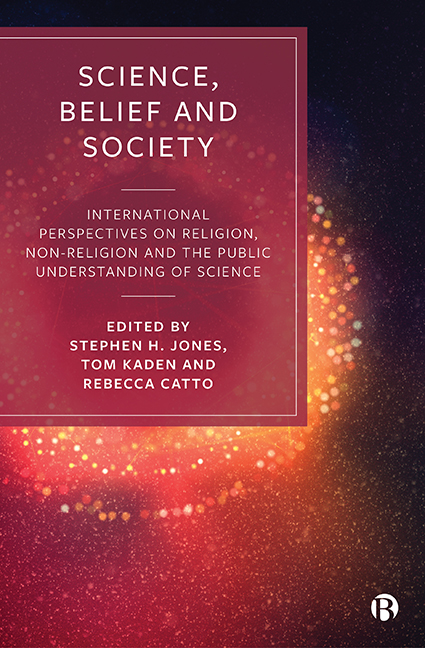 Science, Belief and Society
Science, Belief and Society Book contents
- Frontmatter
- Contents
- List of Figures and Tables
- Notes on Contributors
- Editors’ Acknowledgement
- Foreword
- Editors’ Introduction: Science, Belief and the Sociological Tradition
- PART I Methodological Challenges in the Study of Science and Belief
- PART II Belief in the Study of Science and Technology
- PART III Science, Culture and Non-religion
- PART IV Religion, Conflict and Moderation
- Conclusion: Future Directions in the Sociological Study of Science and Belief
- Index
11 - Science and the Unearned Virtues of the ‘Really Religious People’: Exploring the Association between Perceived Religiosity and Science Rejection among Students in the Midwestern United States
Published online by Cambridge University Press: 27 April 2022
- Frontmatter
- Contents
- List of Figures and Tables
- Notes on Contributors
- Editors’ Acknowledgement
- Foreword
- Editors’ Introduction: Science, Belief and the Sociological Tradition
- PART I Methodological Challenges in the Study of Science and Belief
- PART II Belief in the Study of Science and Technology
- PART III Science, Culture and Non-religion
- PART IV Religion, Conflict and Moderation
- Conclusion: Future Directions in the Sociological Study of Science and Belief
- Index
Summary
Introduction
In many cases, a person's religious identity neither conforms completely to the tidy labels that social scientists use to categorize them, nor is an adequate model to capture the reasoning that a person uses to maintain that identity. As Wuthnow (2008) has described with regards to Americans’ faith practices, our identities look more akin to inclusionary or exclusionary stylistic types rather than to closely following specific tenets. Someone who describes themselves as a member of x or y faith community has much in common with others within that community as an affinity group, but what this is typically varies quite a bit from person to person in terms of both the specific knowledge and ideological orientation of their faith. While this may have differed in the past, recent analyses of the US public have shown that ‘large numbers of Americans are uninformed about the tenets, practices, history and leading figures of major faith traditions – including their own’ (Pew Research Center, 2010). People share nominal identity, but upon scratching them for the specifics, they often express limited or superficial understanding.
In the US, a long history of supposed conflict between religious faith and scientific knowledge has marked the relations of certain politically and socially conservative Christian denominations towards parts of science (Numbers, 2007). Since its arrival in the US, evolutionary theory has posed cognitive and social problems in the minds of certain believers for whom the story that sustains their religious identity is at odds with, and must be rejected in order to accept, evolution. American Christians have dominated this story, but it also includes small minorities of Muslims and Jews, which draw less attention due to small populations of the latter groups in the US (Guhin, 2016). While Christian religious identity has waned slightly in recent years (Pew Forum on Religion and Public Life and Pew Research Center, 2008), the types of believers with a sense of potential conflict with evolutionary theory may be a larger proportion of Christians within an overall slightly shrinking population (Schnabel and Bock, 2017).
In such a context, what can we say about those Americans who either seek to reconcile points of conflict between science and faith or, by virtue of their existing practices, rarely or never experience such conflict?
- Type
- Chapter
- Information
- Science, Belief and SocietyInternational Perspectives on Religion, Non-Religion and the Public Understanding of Science, pp. 241 - 262Publisher: Bristol University PressPrint publication year: 2019


